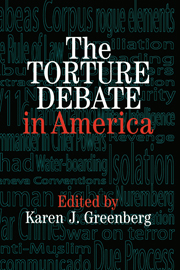Book contents
- Frontmatter
- Contents
- Acknowledgments
- List of Contributors
- Introduction: The Rule of Law Finds Its Golem: Judicial Torture Then and Now
- THE ISSUES
- ESSAYS
- Section One: Democracy, Terror and Torture
- Section Two: On the Matter of Failed States, The Geneva Conventions, and International Law
- 9 Unwise Counsel: The War on Terrorism and the Criminal Mistreatment of Detainees in U.S. Custody
- 10 Rethinking the Geneva Conventions
- 11 If Afghanistan Has Failed, Then Afghanistan Is Dead: “Failed States” and the Inappropriate Substitution of Legal Conclusion for Political Description
- 12 War Not Crime
- Section Three: On Torture
- Section Four: Looking Forward
- RELEVANT DOCUMENTS
- AFTERTHOUGHT
- Index
10 - Rethinking the Geneva Conventions
Published online by Cambridge University Press: 05 August 2012
- Frontmatter
- Contents
- Acknowledgments
- List of Contributors
- Introduction: The Rule of Law Finds Its Golem: Judicial Torture Then and Now
- THE ISSUES
- ESSAYS
- Section One: Democracy, Terror and Torture
- Section Two: On the Matter of Failed States, The Geneva Conventions, and International Law
- 9 Unwise Counsel: The War on Terrorism and the Criminal Mistreatment of Detainees in U.S. Custody
- 10 Rethinking the Geneva Conventions
- 11 If Afghanistan Has Failed, Then Afghanistan Is Dead: “Failed States” and the Inappropriate Substitution of Legal Conclusion for Political Description
- 12 War Not Crime
- Section Three: On Torture
- Section Four: Looking Forward
- RELEVANT DOCUMENTS
- AFTERTHOUGHT
- Index
Summary
They made him blow a bugle for his Uncle Sam
It really brought him down because he couldn't jam
The captain seemed to understand
Because the next day the cap' went out and drafted a band
And now the company jumps when he plays reveille
He's the boogie-woogie bugle boy of Company B.
– Boogie-woogie Bugle Boy, Don Raye & Hughie Prince Popularized by The Andrews Sisters, 1941IT'S HARD TO TALK SENSE ABOUT THE GENEVA CONVENTIONS. THEY ARE Scripture for human rights activists – quite simply “the basis” of international humanitarian law. Attorney General Alberto Gonzales was excoriated in the media, and attacked during his January 2005, confirmation hearings, for merely having suggested that some Geneva provisions were “quaint” when applied to al Qaeda and the Taliban. Countless opponents of American policy in Iraq (and of the war on terror generally) have shouted themselves hoarse claiming that the Bush administration's refusal to grant Geneva prisoner of war (POW) status to unlawful enemy combatants led to the criminal abuses at Abu Ghraib. Many have suggested darkly that American POWs will one day pay for this failure.
In fact, it is high time that the American people had a long and informed talk about the Geneva Conventions. To the extent that, in agreeing to the Geneva treaties, the United States' goal was to obtain decent treatment for Americans, particularly those held as POWs, the effort has failed.
- Type
- Chapter
- Information
- The Torture Debate in America , pp. 203 - 213Publisher: Cambridge University PressPrint publication year: 2005
- 1
- Cited by



